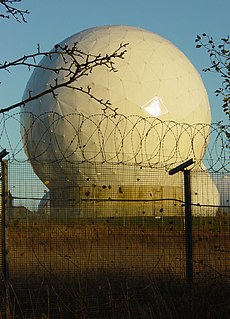 W
WBoundless Informant is a big data analysis and data visualization tool used by the United States National Security Agency (NSA). It gives NSA managers summaries of the NSA's worldwide data collection activities by counting metadata. The existence of this tool was disclosed by documents leaked by Edward Snowden, who worked at the NSA for the defense contractor Booz Allen Hamilton. Those disclosed documents were in a direct contradiction to the NSA's assurance to United States Congress that it does not collect any type of data on millions of Americans.
 W
WIn France, the cabinet noir was a government intelligence gathering office, usually within a postal service, where correspondence between persons or entities were opened and read by government officials before being forwarded to their destination. However, this had to be done with some sophistication, as it was considered undesirable if the subjects of the practice knew about it, and "that the black chamber not interrupt the smooth running of the postal service." This practice had been in vogue since the establishment of postal and telegraphy services, and was frequently used by the ministers of Louis XIII and Louis XIV; but it was not until the reign of Louis XV that a separate office for this purpose was created. This was called the cabinet du secret des postes, or more popularly the cabinet noir. Although declaimed against at the time of the French Revolution, it was used both by the revolutionary leaders and by Napoleon.
 W
WThe Central Monitoring System, abbreviated to CMS, is a centralized telephone interception provisioning system installed by the Centre for Development of Telematics (C-DOT), an Indian Government owned telecommunications technology development centre, and operated by Telecom Enforcement Resource and Monitoring (TERM) Cells. The CMC system is going to be set up in each major state collocated with the TERM Cells. Telecom operators in India are required by law to give access to their networks to law enforcement agencies.
 W
WThe Clarifying Lawful Overseas Use of Data Act or CLOUD Act is a United States federal law enacted in 2018 by the passing of the Consolidated Appropriations Act, 2018, PL 115-141, Division V. The CLOUD Act primarily amends the Stored Communications Act (SCA) of 1986 to allow federal law enforcement to compel U.S.-based technology companies via warrant or subpoena to provide requested data stored on servers regardless of whether the data are stored in the U.S. or on foreign soil.
 W
WDropmire is a surveillance program by the United States' National Security Agency (NSA) aimed at surveillance of foreign embassies and diplomatic staff, including those of NATO allies. The program's existence was revealed in June 2013 by whistleblower Edward Snowden in The Guardian newspaper. The report reveals that at least 38 foreign embassies were under surveillance, some of them as far back as 2007.
 W
WECHELON, originally a secret government code name, is a surveillance program operated by the United States with the aid of four other signatory states to the UKUSA Security Agreement: Australia, Canada, New Zealand, and the United Kingdom, also known as the Five Eyes.
 W
WThe Electronic Communications Privacy Act of 1986 (ECPA) was enacted by the United States Congress to extend restrictions on government wire taps of telephone calls to include transmissions of electronic data by computer, added new provisions prohibiting access to stored electronic communications, i.e., the Stored Communications Act, and added so-called pen trap provisions that permit the tracing of telephone communications . ECPA was an amendment to Title III of the Omnibus Crime Control and Safe Streets Act of 1968, which was primarily designed to prevent unauthorized government access to private electronic communications. The ECPA has been amended by the Communications Assistance for Law Enforcement Act (CALEA) of 1994, the USA PATRIOT Act (2001), the USA PATRIOT reauthorization acts (2006), and the FISA Amendments Act (2008).
 W
WFairview is a secret program under which the National Security Agency cooperates with the American telecommunications company AT&T in order to collect phone, internet and e-mail data mainly of foreign countries' citizens at major cable landing stations and switching stations inside the United States. The FAIRVIEW program started in 1985, one year after the Bell breakup.
 W
WThe Foreign Intelligence Surveillance Act of 1978 is a United States federal law that establishes procedures for the physical and electronic surveillance and the collection of "foreign intelligence information" between "foreign powers" and "agents of foreign powers" suspected of espionage or terrorism. The Act created the Foreign Intelligence Surveillance Court (FISC) to oversee requests for surveillance warrants by federal law enforcement and intelligence agencies. It has been repeatedly amended since the September 11 attacks.
 W
WThe FISA Amendments Act of 2008, also called the FAA and Foreign Intelligence Surveillance Act of 1978 Amendments Act of 2008, is an Act of Congress that amended the Foreign Intelligence Surveillance Act. It has been used as the legal basis for surveillance programs disclosed by Edward Snowden in 2013, including PRISM.
 W
WThe Hemisphere Project, also called simply Hemisphere, is a mass surveillance program conducted by US telephone company AT&T and paid for by the White House Office of National Drug Control Policy and the Drug Enforcement Administration.
 W
WHepting v. AT&T is a United States class action lawsuit filed in January 2006 by the Electronic Frontier Foundation (EFF) against the telecommunications company AT&T, in which the EFF alleges that AT&T permitted and assisted the National Security Agency (NSA) in unlawfully monitoring the communications of the United States, including AT&T customers, businesses and third parties whose communications were routed through AT&T's network, as well as voice over IP telephone calls routed via the Internet.
 W
WThe Invention Secrecy Act of 1951 is a body of United States federal law designed to prevent disclosure of new inventions and technologies that, in the opinion of selected federal agencies, present a possible threat to the national security of the United States.
 W
WJewel v. National Security Agency is a United States class action lawsuit filed by the Electronic Frontier Foundation (EFF) against the National Security Agency (NSA) and several high-ranking officials in the administration of 43rd U.S. president George W. Bush, charging an "illegal and unconstitutional program of dragnet communications surveillance".
 W
WKolab Now is a web-based email and groupware service, based completely on free and open-source software. It is owned and operated by Kolab Systems AG and was formerly known as MyKolab.
 W
WMAINWAY is a database maintained by the United States' National Security Agency (NSA) containing metadata for hundreds of billions of telephone calls made through the four largest telephone carriers in the United States: AT&T, SBC, BellSouth and Verizon.
 W
WThe National Intelligence Law of the People's Republic of China governs China's intelligence and security apparatus. It is the first law made public in China which is related to China's national intelligence agencies. The law however does not specifically name any of the organizations to which it applies such as the Ministry of State Security (MSS) and Ministry of Public Security (MPS). According to the law, "everyone is responsible for state security" which is in line with China's state security legal structure as a whole. The final draft of the law on 16 May 2017 was toned down as compared to previous versions. The National People's Congress passed the law on 27 June 2017. The law was updated on 27 April 2018.
 W
WNSA warrantless surveillance — also commonly referred to as "warrantless-wiretapping" or "-wiretaps" — refers to the surveillance of persons within the United States, including U.S. citizens, during the collection of notionally foreign intelligence by the National Security Agency (NSA) as part of the Terrorist Surveillance Program. In late 2001, the NSA was authorized to monitor, without obtaining a FISA warrant, the phone calls, Internet activity, text messages and other communication involving any party believed by the NSA to be outside the U.S., even if the other end of the communication lay within the U.S.
 W
WThe Omnibus Crime Control and Safe Streets Act of 1968 was legislation passed by the Congress of the United States and signed into law by President Lyndon B. Johnson that established the Law Enforcement Assistance Administration (LEAA). Title III of the Act set rules for obtaining wiretap orders in the United States. The act was a major accomplishment of Johnson's war on crime.
 W
WPinwale is the code name for a National Security Agency (NSA) collection and retrieval system for so-called "Digital Network Intelligence", including internet e-mail. It is searchable by monitored NSA analysts.
 W
WPRISM is a code name for a program under which the United States National Security Agency (NSA) collects internet communications from various U.S. internet companies. The program is also known by the SIGAD US-984XN. PRISM collects stored internet communications based on demands made to internet companies such as Google LLC under Section 702 of the FISA Amendments Act of 2008 to turn over any data that match court-approved search terms. Among other things, the NSA can use these PRISM requests to target communications that were encrypted when they traveled across the internet backbone, to focus on stored data that telecommunication filtering systems discarded earlier, and to get data that is easier to handle.
 W
WRAMPART-A is the code name for global mass surveillance and world-wide signals intelligence partnership program led by the United States National Security Agency (NSA). Aim of the program is to "gain access to high-capacity international fiber-optic cables that transit at major congestion points around the world".
 W
WRestore the Fourth is an American 501(c)(4) nonprofit organization that seeks to strengthen the Fourth Amendment to the United States Constitution and eliminate programs that violate it. It organized protests in 2013 and 2014, and in 2015 helped to introduce the Surveillance State Repeal Act, besides other lobbying activities.
 W
WRobbins v. Lower Merion School District is a federal class action lawsuit, brought in February 2010 on behalf of students of two high schools in Lower Merion Township, a suburb of Philadelphia. In October 2010, the school district agreed to pay $610,000 to settle the Robbins and parallel Hasan lawsuits against it.
 W
WRoom 641A is a telecommunication interception facility operated by AT&T for the U.S. National Security Agency, as part of its warrantless surveillance program as authorized by the Patriot Act. The facility commenced operations in 2003 and its purpose was publicly revealed in 2006.
 W
WThe Sarah Palin email hack occurred on September 16, 2008, during the 2008 United States presidential election campaign when vice presidential candidate, Sarah Palin's, Yahoo! personal email account was subjected to unauthorized access. The hacker, David Kernell, obtained access to Palin's account by looking up biographical details, such as her high school and birthdate, and using Yahoo!'s account recovery for forgotten passwords. Kernell then posted several pages of Palin's email on 4chan's /b/ board. Kernell, who at the time of the offense was a 20-year-old college student, was the son of longtime Democratic state representative Mike Kernell of Memphis.
 W
WThe secrecy of correspondence or literally translated as secrecy of letters, is a fundamental legal principle enshrined in the constitutions of several European countries. It guarantees that the content of sealed letters is never revealed, and that letters in transit are not opened by government officials, or any other third party. The right of privacy to one's own letters is the main legal basis for the assumption of privacy of correspondence.
 W
WThe following is a section summary of the USA PATRIOT Act, Title II. The USA PATRIOT Act was passed by the United States Congress in 2001 as a response to the September 11, 2001 attacks. Title II: Enhanced Surveillance Procedures gave increased powers of surveillance to various government agencies and bodies. This title has 25 sections, with one of the sections containing a sunset clause which sets an expiration date, 31 December 2005, for most of the title's provisions. On 22 December 2005, the sunset clause expiration date was extended to 3 February 2006.
 W
WSentry Eagle, the National Initiative Protection Program, is a compartmented program of the National Security Agency's (NSA) Central Security Service (CSS) and the US Strategic Command Joint Functional Component Command - Network Warfare (JFCC-NW). Its existence was revealed during the 2013 global surveillance disclosure by Edward Snowden.
 W
WThe Stored Communications Act is a law that addresses voluntary and compelled disclosure of "stored wire and electronic communications and transactional records" held by third-party internet service providers (ISPs). It was enacted as Title II of the Electronic Communications Privacy Act of 1986 (ECPA).
 W
WTempora is the codeword for a formerly-secret computer system that is used by the British Government Communications Headquarters (GCHQ). This system is used to buffer most Internet communications that are extracted from fibre-optic cables, so these can be processed and searched at a later time. It was tested from 2008 and became operational in late 2011.
 W
WThinThread was an intelligence gathering project by the United States National Security Agency (NSA) conducted throughout the 1990s. The program involved wiretapping and sophisticated analysis of the resulting data. The program was discontinued three weeks before the September 11, 2001 attacks due to the changes in priorities and the consolidation of U.S. intelligence authority.
 W
WTotal Information Awareness (TIA) was a mass detection program by the United States Information Awareness Office. It operated under this title from February to May 2003 before being renamed Terrorism Information Awareness.
 W
WTrailblazer was a United States National Security Agency (NSA) program intended to develop a capability to analyze data carried on communications networks like the Internet. It was intended to track entities using communication methods such as cell phones and e-mail.
 W
WThe United Kingdom – United States of America Agreement is a multilateral agreement for cooperation in signals intelligence between Australia, Canada, New Zealand, the United Kingdom, and the United States. The alliance of intelligence operations is also known as the Five Eyes. In classification markings this is abbreviated as FVEY, with the individual countries being abbreviated as AUS, CAN, NZL, GBR, and USA, respectively.
 W
WUnited States v. Moalin is a court case that was heard and decided by the United States Court of Appeals for the Ninth Circuit. It was an appeal by four Somali individuals that had been convicted based on data obtained through bulk telephone data collection by the National Security Agency. The appeals court upheld their convictions, but also ruled that bulk telephone data collection by the National Security Agency, the details of which were leaked by Edward Snowden, was illegal.
 W
WUnmasking by U.S. intelligence agencies typically occurs after the United States conducts eavesdropping or other intelligence gathering aimed at foreigners or foreign agents, and the name of a U.S. citizen or entity is incidentally collected. Intelligence reports are then disseminated within the U.S. government, with such names masked to protect those U.S. citizens from invasion of privacy. The names can subsequently be unmasked upon request by authorized U.S. government officials under certain circumstances. Unmaskings occur thousands of times each year, totaling 10,012 in 2019.
 W
WThe Utah Data Center (UDC), also known as the Intelligence Community Comprehensive National Cybersecurity Initiative Data Center, is a data storage facility for the United States Intelligence Community that is designed to store data estimated to be on the order of exabytes or larger. Its purpose is to support the Comprehensive National Cybersecurity Initiative (CNCI), though its precise mission is classified. The National Security Agency (NSA) leads operations at the facility as the executive agent for the Director of National Intelligence. It is located at Camp Williams near Bluffdale, Utah, between Utah Lake and Great Salt Lake and was completed in May 2014 at a cost of $1.5 billion.
 W
WA warrant canary is a method by which a communications service provider aims to inform its users that the provider has been served with a government subpoena despite legal prohibitions on revealing the existence of the subpoena. The warrant canary typically informs users that there has not been a court-issued subpoena as of a particular date. If the canary is not updated for the period specified by the host or if the warning is removed, users are to assume that the host has been served with such a subpoena. The intention is for a provider to warn users of the existence of a subpoena passively while possibly "technically" not violating a court order not to do so.
 W
WThis article provides a detailed chronological account of the historical reception and criticism of security and privacy features in the WhatsApp messaging service.
 W
WXKeyscore is a secret computer system used by the United States National Security Agency (NSA) for searching and analyzing global Internet data, which it collects continually. The NSA has shared XKeyscore with other intelligence agencies, including the Australian Signals Directorate, Canada's Communications Security Establishment, New Zealand's Government Communications Security Bureau, Britain's Government Communications Headquarters, Japan's Defense Intelligence Headquarters, and Germany's Bundesnachrichtendienst.